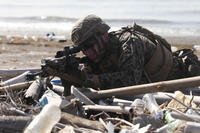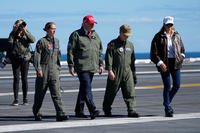This is the affidavit of Ellsworth Wallace Haynes, U.S. Navy.
[On] Dec. 7th, 1941, I was working at the Curtis-Wright Co., where airplane engines were built. I was told that I was deferred from the draft, but I was very disturbed about Japan's plans to invade the United States. So, early in 1942, a friend and I went to the Brooklyn Navy yard and joined up. We were sent to Providence, R.I., for boot camp training, which took place on the Brown University campus. We were there for eight weeks, and then my friend and I were separated, never to meet again.
My orders sent me to Navy Pier, in Chicago, Illinois. When I arrived in Chicago the locals were as kind to Navy trainees as anyone could ever want. Every day a group of Navy trainees were invited to someone's home for food and entertainment.
But by the time I left, all this was ending. A few rotten apples had ruined a good time for all. Since we did not stay [for] any length of time at any camp until Camp#3 Cabanatuan, I did not observe anything outstanding or unusual at Fort Hughes or Corregidor or Bilibid Prison. We received the routine treatment at 92nd Garage on Corregidor, which consisted of a lack of food, water, bedding and shelter.
I was at Navy pier for eight weeks and became a fireman rate instead of apprentice seaman. My orders were now to Norfolk, Virginia, by train. Upon arrival, I was given liberty. The city was a long way from the Navy base, but electric streetcars made several trips per day. All taverns closed at midnight so that the military had time to return to base before reveille.
The streetcar was standing room only and so very noisy. The conductor stopped the car and told the passengers to be quiet, or he would go no farther. A sailor with hash marks to his elbow opened the door, took the conductor by the neck and dropped him outside. He closed the door, took the controls and ran the car to the base. I went to bed so [I] don't know what happened next.
Next day, I was ordered aboard a troop transport APA USS John Penn. The ship loaded 5,000 Seabees and equipment and got under way through the Chesapeake Bay. As we went around Cape Hatteras, N.C., we got caught in a very bad storm.
Many, many people were seasick. We actually lost six Seabees over the side while being sick. Never saw them again. It was explained that we could not stop for anyone overboard.
We proceeded through the Panama Canal and after some time ended up in Guadalcanal. We arrived before daybreak and left after dark. Next stop: Noumea, New Caledonia, a staging area for troops being readied for invasions. A very small island just off Noumea was a leper colony. I was a fireman in a Higgins boat crew, so our ship's doctor and my boat crew took some food to that place, and it sure made a lasting impression on me. How pathetic those poor people were.
I was soon promoted to 2nd class MoMM [motor machinist's mate] as we made more trips to Guadalcanal, Tulagi, Savo, etc., always returning to Noumea to reload. On March 29, 1943, my 23rd birthday, John Penn was in Suva, Fiji. There was a hotel near the docks and I was allowed to go ashore. I had not had much to celebrate in a long time, so I decided to have a good time that day.
Several of my buddies were there and we figured it might be my last birthday, so we overdid the celebration. I smuggled a bottle of Kimmel back aboard the ship in order to give my chief a drink. We both got loaded and my chief named Bingham fell into a glass gauge and cut his shoulder. The division officer named Commander Haligan was not a friendly sort to enlisted men, and he was not at all happy about March 29th.
Fortunately, there was another MoMM 2/c on the ship named Hartman that Haligan thought was me. Hartman's boat and crew were ordered to stay on the Russell Islands the next time the ship sent a boat to visit, which was standard procedure whenever a new island was visited, so that a pool of boats and crews could be established. That same night at GQ, Commander Haligan saw me and he had to ask the chief why I was there and not on the island. It was explained that I was not on the island, because Hartman had been transferred instead of me.
Our next trip was to Guadalcanal carrying 5,000 soldiers for reinforcement. We had finished unloading and were taking on the outgoing mail when the John Penn was sunk! The war ships had fought the Japanese airplanes all day and had kept them away from the transports, but just at sunset, one lone torpedo plane got through and hit us with a torpedo and crashed his plane into the superstructure. That changed my life forever. The lives of 111 enlisted men and 13 officers were lost that day, Friday August 13.
The crew of 400 plus had become my family. Many of us had exchanged addresses and planned to meet after the war, if we were lucky enough to survive. My address book was in my locker, as were all my other personal possessions. I never got close to anyone again.
After a few hours in the water, a Higgins boat crew from the island picked me up. I spent the night in a foxhole on Guadalcanal. Next day the APA Hunter Liggett took me and other survivors back to Noumea where we were isolated for 14 days to give the Navy time to contact next of kin. On the 14th day I mailed a notice to the only person I contacted, my mother, who heard the news that the Penn was sunk the same day my letter arrived.
I was next ordered to the USS President Jackson, APA 18, another troop transport. It was loaded with 5,000 Marines headed for Bougainville. The Jackson always teamed with three other transports, the President Adams, the President Monroe and the Crescent City.
These four ships had earned the nickname "The Unholy Four," due to the large number of enemy planes they shot down. Tokyo Rose was always broadcasting what was about to happen to us, but it never happened. However, while unloading Marines at Bougainville, the Japanese nearly succeeded. A dive bomber hit the Jackson mid-deck with a 500-pound bomb, which did not explode. Lucky for me, because I was working not 30 feet away. A group of Marines put the bomb over the side (Brave people, those Marines).
We went in dry dock in New Zealand at some point in the war, and we also visited Australia with wounded from the Islands but I do not remember when. One night, we were steaming in single file through the slot between New Britain and New Guinea, and after standing an 8-to-12 midnight watch in the engine room, I went on deck for a little fresh air before getting some sleep. I was leaning on the rail just cooling off when a destroyer ahead of us turned on floodlights and opened fire on a Jap submarine on the surface that was charging batteries. I expect I lost a year or two of my life from fear that night. The Japs lost it all in a very short time. We landed the next day in New Guinea.
Two sailors and one Marine sergeant escaped. They were gone about 10 days before they were caught and returned to camp and shot. The Marine's name was Chastine, and the sailor was called Freddie Marigold, from Waco, Texas.
The Jackson went to Luzon, Leyte, Guam and many other invasions. I had now progressed to MoMM1/c and no longer had to man Higgins boats but did man a salvage boat when needed. The last invasion I was in was Iwo Jima. We unloaded 5,000 Marines and equipment. I was on board with field glasses, keeping track of our boats to see that none were in trouble, and I could watch the invasion's progress up Mount Suribachi, where I saw so many of the young Marines being killed that had just left our ship. I was privileged to see the Marines raise Old Glory on the mountain. I cried like a baby. I saw the original flag-raising, not the later one staged for the photos.
Due to mechanical problems that developed at Iwo, the Jackson was forced to return to the States for repairs. I was given 18 days leave, with delayed orders not to return to the Jackson. It took over a month to reach the States due to the mechanical problems. I spent my 18 days with my mother and reported to the Seattle, Washington, Navy Base. My orders were to be first engineer on a yard oiler.
And that's where I was when the war ended. Due to my long overseas duty, I was scheduled for discharge immediately. I was given a ferry ticket to Bremerton for discharge, but I had to buy my own ticket from there back to Seattle, where I picked up my wife and bummed a ride to L.A., my wife's hometown.
I feel that a Guardian Angel was on my shoulder for the duration.
Want to Know More About the Military?
Be sure to get the latest news about the U.S. military, as well as critical info about how to join and all the benefits of service. Subscribe to Military.com and receive customized updates delivered straight to your inbox.















